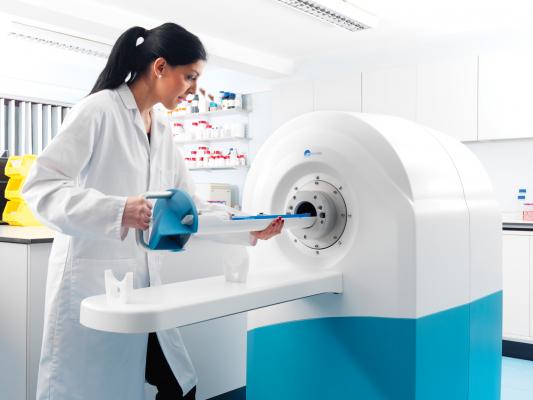
August 7, 2015 — British-based MR Solutions has introduced the world’s first commercial, superconducting, preclinical magnetic resonance imaging (MRI) scanner that does not require the traditional liquid helium cooling jacket. The introduction follows a call in June by anaesthetist Tom Dolphin of the British Medical Association’s junior doctors’ committee for a ban on using helium in balloons, as there is a shortage for MRI scanners.
David Taylor, physicist and CEO of MR Solutions predicts that “within five years all new MRI scanners will be able to do away with the liquid helium jacket that keeps the superconducting magnet at four degrees above absolute zero - a chilly minus 269 degrees centigrade.”
Taylor continued, “We first developed a 3 Tesla in 2013. Today we are developing a 7T helium-free scanner and it will only be a few years before we/the industry scales up to produce helium-free clinical MRI scanners.”
This development has significant benefits for the scientific community as the global shortage of helium is today posing a risk for medical research projects across the world, with doctors calling for a halt in the use of helium party balloons.
Taylor explained that the helium-free scanner uses a new magnet design incorporating superconducting wire. “This enables the use of a standard low-temperature fridge to cool the magnet to the required 4° Kelvin (-269°C),” he said. “This has resulted in a scanner with improved performance, less costly to buy, lower running costs and no need for the building modification works which were required for the old MRI systems.”
As the second most common element in the universe, why is there such a shortage? Helium needs to be extracted and collected when mining for natural gas. If it is not extracted it is simply vented into the atmosphere and because it is so light leaks out into space. Therefore companies mining for natural gas have to be motivated to extract and store the helium.
In 1996 the United States government started selling off its strategic holding of helium at low prices as it was no longer considered a strategic material. This led to an excess of cheap helium on the world market, resulting in an environment whereby oil companies were no longer incentivized to collect helium during the mining of natural gas. However with dwindling U.S. supplies and few businesses capturing the gas, there is now a real shortage.
Prof. Ray Dolan of University College London leads the Wellcome Trust Centre for Neuroimaging, which had to stop taking bookings for its scanner in 2012 because of helium shortages. “We have now had to invest in expensive helium-capture technology to recover some of what is burnt off,” he said, “and this decision was driven by a need to insulate ourselves against uncertainty over supply and cost.”
For more information: www.mrsolutions.com


 February 13, 2026
February 13, 2026 









